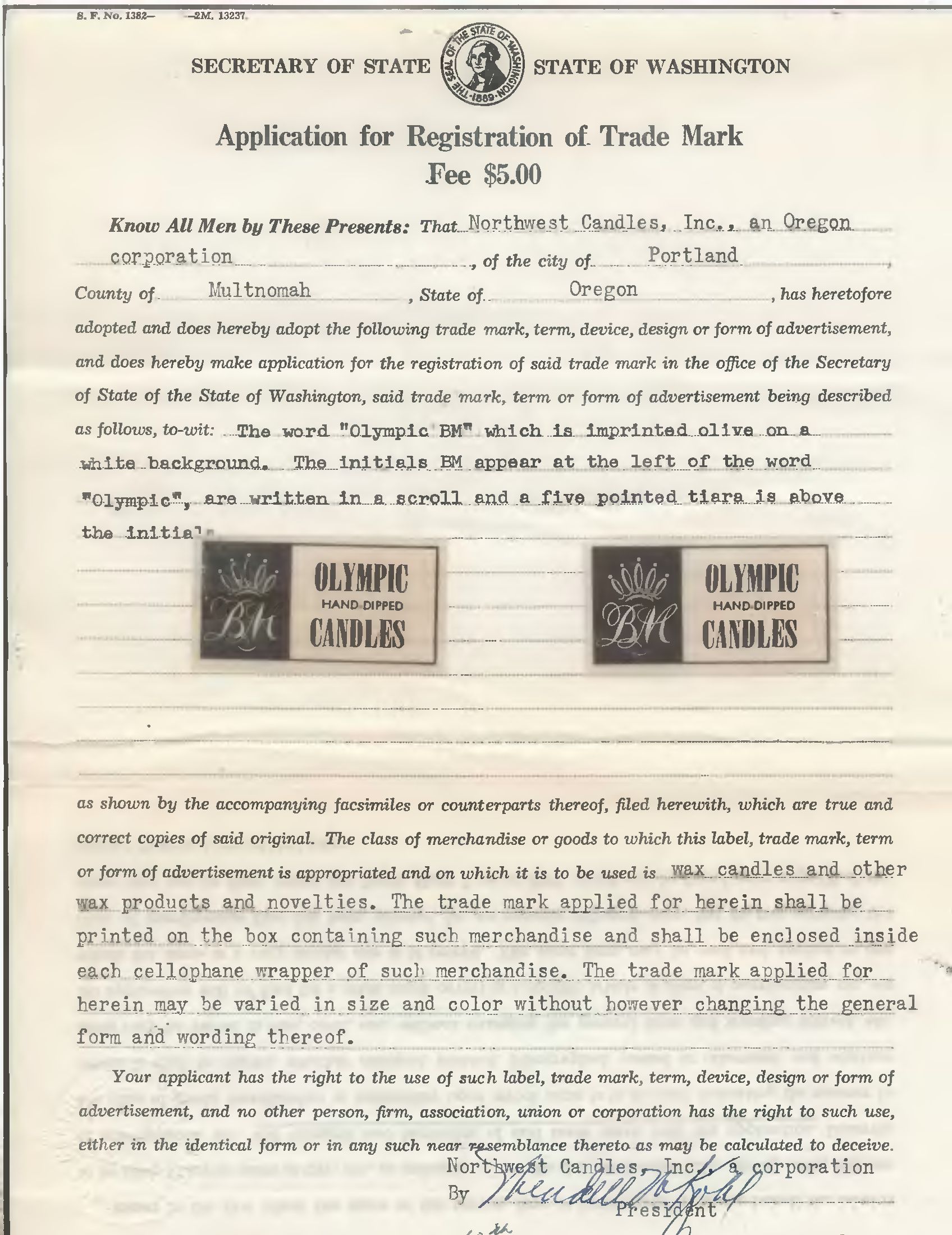Entries from March 1, 2013 - March 31, 2013
Search Washington Trademark Filings for Free
 A sample application for statewide trademark registration.
A sample application for statewide trademark registration.
Users can now search filings from 1888 to 2011 for free
It’s now possible to search Washington trademark registrations for free.
The Washington Secretary of State’s digital archives have added trademark records to its searchable online database.
Start with the digital archives home page. Select “Trademark Records” from the dropdown menu under the “Search by Keyword” or “Detailed Search” options, enter the search criteria, and click the “Search” button.
The “Detailed Search” option enables searching by keyword, registration number, owner name, document type (amendment, application, assignment, renewal, and reservation), and range of filing dates.
Results display the trademark number, owner’s name, document type, received date, and even a copy of the application, specimens of use, and registration certificate.
The site states the database includes “active and inactive trademark records filed with the Secretary of State’s Office, Corporations Division from 1888 to 2011.”
This is a pretty awesome tool that previously was available only through third-party vendors.
Thanks to the State of Washington for making this available. And thanks to Shannon Whitmore for letting me in on the secret!
March Madness Teaches It Doesn't Pay to Claim Someone Else's Trademark
We can all learn something from MARCH MADNESS.
There’s no profit in trying to register someone else’s trademark.
Check it out. The NCAA owns a registration for MARCH MADNESS. Actually, a bunch of them. This one’s for “Enterertainment in the nature of basketball tournaments between college teams,” with a first-use date of March 31, 1982.
But does that stop others from trying to grab a piece of the madness? It should, but it doesn’t.
Here’s a few of the applications to register MARCH MADNESS by wrong-headed entrepreneurs (or fans) with a little extra spring spirit:
- MARCH MADNESS OR MARCH MADDNESS, for “Two words describing College Basketball in March or proceedings March, surrounding the NCAA, Women’s NCAA, Men’s or Women’s NIT Tournaments or any corresponding Men’s or Women’s NCAA Conference Tournaments; regardless of division classification; as described by the NCAA or any of its collegiate partners.” Status: Abandoned
- MOBILE MARCH MADNESS, for “SMS automatic sports updates.” Status: Abandoned
- MARCH MADNESS, for “shoes and clothing, namely sweatshirts, T-shirts, sweatpants.” Status: Abandoned
Revel in the madness. But trying to copy it and claim it for your own just doesn’t work.
For old time’s sake, check out this March Madness post from the dusty STL archives here.
Ninth Circuit Upholds Insurance Exclusion for Misleading Domain Name
I’m not much of an insurance guy, but these cases don’t come along too often, so they’re interesting when they do: courts interpreting insurance policies as they relate to coverage for trademark infringement.
The underlying dispute arose out of a trademark infringement complaint that AcademyOne, Inc., filed against CollegeSource, Inc. AcademyOne claimed that CollegeSource had registered AcademyOne’s trademark as its domain name, which was likely to divert AcademyOne’s customers to CollegeSource’s Web site.
CollegeSource tendered a claim to its insurer, Travelers Indemnity. When Travelers denied the claim, CollegeSource sued for breach of contract.
Travelers moved for judgment on the pleadings, and the Southern District of California granted the motion. It found the underlying trademark infringement claim fell within the policy’s exclusion for “‘personal injury,’ ‘advertising injury,’ and ‘web site injury’ arising out of the unauthorized use of another’s name or product in your email address, domain name or metatag, or any other similar activities that mislead another’s potential customers.”
On appeal, the Ninth Circuit agreed. It found that “[e]ven construing the exclusion narrowly, the phrase ‘any other similar activities that mislead another’s potential customers’ can be read only as referring to activities similar to ‘unauthorized uses of another’s name or product in your e-mail address, domain name, or metatag,’ because ‘use’ is the only word in the clause which constitutes an ‘activity.’”
It also rejected CollegeSource’s contrary interpretation. “The only reasonable reading of the complaint’s allegation (that CollegeSource used AcademyOne’s domain name in its own domain name in a way likely to cause confusion in the marketplace) is that it claims injury from an activity that (1) is ‘similar to’ the unauthorized use of another’s name or product in one’s domain name, and (2) would mislead customers. We also reject CollegeSource’s argument that Travelers’s removal of a trademark infringement exclusion from the policy shows an intent to provide coverage for domain name infringement. Because the language of the Unauthorized Use exclusion is unambiguous, we do not consider drafting history or other extrinsic sources to determine the parties’ intent.”
The case cite is CollegeSource, Inc. v. Travelers Indem. Co. of Connecticut, No. 11-55708, 2013 WL 492462 (9th Cir. Feb. 11, 2013).
